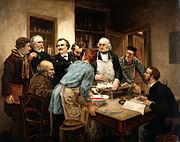
Oil painting depicting Claude Bernard, the father of modern physiology, with his pupils
Physiology is the scientific study of the functions and mechanisms which work within a living system.
As a sub-discipline of biology, the focus of physiology is on how organisms, organ systems, organs, cells, and biomolecules carry out the chemical and physical functions that exist in a living system.
Central to an understanding of physiological functioning is the investigation of the fundamental biophysical and biochemical phenomena, the coordinated homeostatic control mechanisms, and the continuous communication between cells.
The physiologic state is the condition occurring from normal body function, while the pathological state is centered on the abnormalities that occur in animal diseases, including humans.
According to the type of investigated organisms, the field can be divided into, animal physiology (including that of humans), plant physiology, cellular physiology and microbial physiology.
The Nobel Prize in Physiology or Medicine is awarded to those who make significant achievements in this discipline by the Royal Swedish Academy of Sciences.
Foundations of physiology[]
Animals[]
- Main articles: Zoology#Physiology
Humans[]
- Main articles: Human body#Physiology
Human physiology seeks to understand the mechanisms that work to keep the human body alive and functioning, through scientific enquiry into the nature of mechanical, physical, and biochemical functions of humans, their organs, and the cells of which they are composed. The principal level of focus of physiology is at the level of organs and systems within systems. The endocrine and nervous systems play major roles in the reception and transmission of signals that integrate function in animals. Homeostasis is a major aspect with regard to such interactions within plants as well as animals. The biological basis of the study of physiology, integration refers to the overlap of many functions of the systems of the human body, as well as its accompanied form. It is achieved through communication that occurs in a variety of ways, both electrical and chemical.
Changes in physiology can impact the mental functions of individuals. Examples of this would be the effects of certain medications or toxic levels of substances. Change in behavior as a result of these substances is often used to assess the health of individuals.
Much of the foundation of knowledge in human physiology was provided by animal experimentation. Due to the frequent connection between form and function, physiology and anatomy are intrinsically linked and are studied in tandem as part of a medical curriculum.
Plants[]
- Main articles: Plant physiologyPlant physiology is a subdiscipline of botany concerned with the functioning of plants. Closely related fields include plant morphology, plant ecology, phytochemistry, cell biology, genetics, biophysics, and molecular biology. Fundamental processes of plant physiology include photosynthesis, respiration, plant nutrition, tropisms, nastic movements, photoperiodism, photomorphogenesis, circadian rhythms, seed germination, dormancy, and stomata function and transpiration. Absorption of water by roots, production of food in the leaves, and growth of shoots towards light are examples of plant physiology.
Cells[]
- Main articles: Cell physiologyAlthough there are differences between animal, plant, and microbial cells, the basic physiological functions of cells can be divided into the processes of cell division, cell signaling, cell growth, and cell metabolism.
Microorganisms[]
- Main articles: MicroorganismMicroorganisms can be found almost everywhere on Earth. Types of microorganisms include archaea, bacteria, eukaryotes, protists, fungi, and micro-plants. Microbes are important in human culture and health in many ways, serving to ferment foods, treat sewage, produce fuel, enzymes and other bioactive compounds. They are essential tools in biology as model organisms and have been put to use in biological warfare and bioterrorism. They are a vital component of fertile soils. In the human body microorganisms make up the human microbiota including the essential gut flora. They are the pathogens responsible for many infectious diseases and as such are the target of hygiene measures. Most microorganisms can reproduce rapidly, and bacteria are also able to freely exchange genes through conjugation, transformation and transduction, even between widely divergent species.
Viruses[]
- Main articles: Virus
Subdisciplines[]
There are many ways to categorize the subdiscplines of physiology:
- based on the taxa studied: human physiology, animal physiology, plant physiology, microbial physiology, viral physiology
- based on the level of organization: cell physiology, molecular physiology, systems physiology, organismal physiology, ecological physiology, integrative physiology
- based on the process that causes physiological variation: developmental physiology, environmental physiology, evolutionary physiology
- based on the ultimate goals of the research: applied physiology (e.g., medical physiology), non-applied (e.g., comparative physiology)
References[]

|
This page uses content that though originally imported from the Wikipedia article Physiology might have been very heavily modified, perhaps even to the point of disagreeing completely with the original wikipedia article. The list of authors can be seen in the page history. The text of Wikipedia is available under the Creative Commons Licence. |